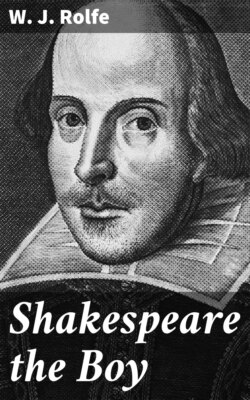Читать книгу Shakespeare the Boy - W. J. Rolfe - Страница 12
На сайте Литреса книга снята с продажи.
CHARLECOTE HALL.
ОглавлениеTable of Contents
Returning to Warwick, and travelling eight miles on the other side of the town, we come to Stratford. By one of the two roads we may take we pass Charlecote Hall and Park, associated with the tradition of Shakespeare's deer-poaching—a fine old mansion, seen across a breadth of fields dotted with tall elms.
CHARLECOTE HALL
The winding Avon skirts the enclosure to the west. The house, which has been in the possession of the Lucy family ever since the days of Shakespeare, stands at the water's edge. It has been enlarged in recent times, but the original structure has undergone no material change. It was begun in 1558, the year when Elizabeth came to the throne, and was probably finished in 1559. It took the place of a much older mansion of which no trace remains, the ancestors of Sir Thomas Lucy having then held the estate for more than five centuries. The ground plan of the house is in the form of a capital letter E, being so arranged as a compliment to the Virgin Queen; and only one out of many such tributes paid her by noble builders of the time. Over the main door are the royal arms, with the letters E. R., together with the initials of the owner, T. L.
Within there is little to remind one of the olden time, but some of the furniture of the library—chairs, couch, and cabinet of coromandel-wood inlaid with ivory—is said to have been presented by Elizabeth to Leicester in 1575, and to have been brought from Kenilworth in the seventeenth century. There is a modern bust of Shakespeare in the hall.
The tradition that the dramatist in his youth was guilty of deer-stealing in Sir Thomas's park is not improbable. Some critics have endeavored to prove that there was no deer-park at Charlecote at that time; but Lucy had other estates in the neighborhood, on some of which he employed game-keepers, and in March, 1585, about the date of the alleged poaching, he introduced a bill into Parliament for the better preservation of game.
The strongest argument in favor of the tradition is to be based on the evidence furnished by the plays that Shakespeare had a grudge against Sir Thomas, and caricatured him as Justice Shallow in Henry IV. and The Merry Wives of Windsor. The reference in the latter play to the "dozen white luces" on Shallow's coat of arms is palpably meant to suggest the three luces, or pikes, in the arms of the Lucys. The manner in which the dialogue dwells on the device indicates that some personal satire was intended.
It should be understood that poaching was then regarded, except by the victims of it, as a venial offence. Sir Philip Sidney's May Lady calls deer-stealing "a prettie service." The students at Oxford were the most notorious poachers in the kingdom, in spite of laws making expulsion from the university the penalty of detection. Dr. Forman relates how two students in 1573 (one of whom afterwards became Bishop of Worcester) were more given to such pursuits than to study; and one good man lamented in later life that he had missed the advantages that others had derived from these exploits, which he believed to be an excellent kind of discipline for young men.
ENTRANCE TO CHARLECOTE HALL
We must not assume that Sir Thomas was fairly represented in the character of Justice Shallow. On the contrary, he appears to have been an able man and magistrate, and very genial withal. The Stratford records bear frequent testimony to his judicial services; and his attendance on such occasions is generally coupled with a charge for claret and sack or similar beverages. It is rather amusing that these entries occur even when he is sitting in judgment on tipplers. In the records for 1558 we read: "Paid for wine and sugar when Sir Thomas Lucy sat in commission for tipplers, xx d."
SIR THOMAS LUCY
That he was a good husband we may infer from the long epitaph of his wife in Charlecote Church, which, after stating that she died in 1595, at the age of 63, goes on thus: "all the time of her life a true and faithful servant of her good God; never detected of any crime or vice; in religion most sound; in love to her husband most faithful and true; in friendship most constant; to what in trust was committed to her most secret; in wisdom excelling; in governing of her house and bringing up of youth in the fear of God that did converse with her, most rare and singular; a great maintainer of hospitality; greatly esteemed of her betters, misliked of none unless of the envious. When all is spoken that can be said, a woman so furnished and garnished with virtue as not to be bettered, and hardly to be equalled by any. As she lived most virtuously, so she died most godly. Set down by him that best did know what hath been written to be true, Thomas Lucy."
The author of this beautiful tribute may have been a severe magistrate, but he could not have been a Robert Shallow either in his official capacity or as a man.
